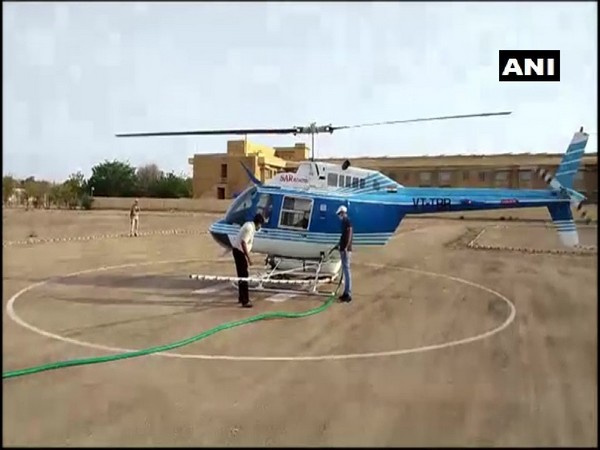Locust control: Chemical spraying in targeted areas begins, Bell Helicopter makes first sortie in Jaisalmer
A Bell Helicopter took its first sortie in Banda area of Jaisalmer district in Rajasthan on Saturday and completed its mission of chemical spraying in targeted areas and check damage to crops from locust attacks.

- Country:
- India
A Bell Helicopter took its first sortie in Banda area of Jaisalmer district in Rajasthan on Saturday and completed its mission of chemical spraying in targeted areas and check damage to crops from locust attacks. "Control operations to check damage to crops from locust attacks are continuing. Yesterday, a new dimension was added in locust control activities. A Bell Helicopter took its first sortie in 65 RD Banda area of Jaisalmer district in Rajasthan and completed its mission of chemical spraying in targeted areas; thereby augmenting the locust control efforts," he Ministry of Agriculture and Farmers Welfare said in a statement.
Starting from April 11, 2020, till July 3, 2020, control operations have been done in 1,35,207 hectares area in States of Rajasthan, Madhya Pradesh, Punjab, Gujarat, Uttar Pradesh and Haryana by Locust Circle Offices (LCOs), the Union Agriculture Ministry said. The Ministry said till July 3, 2020, control operations have also been done in 1,13,215.5 hectares area in States of Rajasthan, Madhya Pradesh, Punjab, Gujarat, Uttar Pradesh, Maharashtra, Chhatisgarh, Haryana and Bihar by State Governments.
It further said, "In the intervening night of 3rd and 4th July, 2020, control operations were carried out at 25 places in six districts viz. Jaisalmer, Barmer, Bikaner, Jodhpur, Nagaur, and Dausa of Rajasthan State and two places in Jhansi district of Uttar Pradesh by LCOs. Besides this, State Agriculture Departments also carried out control operations at four places in Jhansi and Mahoba districts of Uttar Pradesh and at two places in Bharatpur district of Rajasthan, in the intervening night of 3rd - 4th July, 2020 against small groups and scattered population of locusts.
The Ministry further informed that no significant crop losses have been reported in the States of Gujarat, Uttar Pradesh, Madhya Pradesh, Maharashtra, Chhatisgarh, Bihar and Haryana. However, some minor crop losses have been reported in some districts of Rajasthan. Swarms of immature pink locusts and adult yellow locusts are active in Jaisalmer, Barmer, Bikaner, Jodhpur, Nagaur, Dausa and Bharatpur of Rajasthan State and Jhansi and Mahoba districts of Uttar Pradesh, it said.
The press release said, "Presently 60 control teams with spray vehicles are deputed /deployed in State of Rajasthan, Gujarat, Madhya Pradesh and Uttar Pradesh more than 200 Central Government personnel are engaged in locust control operations." "Further, five companies with 12 drones are deployed at Barmer, Jaisalmer, Bikaner, Nagaur and Phalodi in Rajasthan for effective control of locusts on tall trees and in inaccessible areas through spraying of pesticides. India is the first country who is using drones for locust control," the press release said.
On May 21, 2020, MoCA granted a conditional exemption to the Government Entity for use of remotely Piloted Air Craft System for anti-locust operations subject to various terms and conditions. Further, on June 27, 2020, MoCA further relaxed the terms and conditions and permitted the use of engine-powered drone up to 50kg and use of drones during night times also for anti-locust operations "As per the Food and Agriculture Organization's Locust Status Update of July 3, many of the spring-bred swarms that migrated to Indo-Pak border before the monsoon rains, some continued east to northern states of India and a few groups reached Nepal," the press release said.
The forecast is that these swarms will return to Rajasthan with the start of the monsoon in the coming days to join other swarms still arriving from Iran and Pakistan, which is expected to be supplemented by swarms from the Horn of Africa in about mid-July. Early breeding has already occurred along the India-Pakistan border where substantial hatching and band formation will take place in July that will cause the first-generation summer swarms to form in mid-August.
"Weekly virtual meeting on Desert Locust of South-West Asian countries (Afghanistan, India, Iran and Pakistan) is being organised by FAO. 15 virtual meetings of the technical officers of South West Asian countries have taken place so far," it added. (ANI)
(This story has not been edited by Devdiscourse staff and is auto-generated from a syndicated feed.)
ALSO READ
Unmasking Misinformation: How Fake News Shook Pakistan
Nepali Congress Stands Firm on Grant-Based BRI Projects
Pakistan's Internet Woes: Navigating Sluggish Speeds and Surveillances
Temba Bavuma Leads Proteas to WTC Top Spot, Eyes Pakistan Challenge
Delhi NGOs Demand Rehabilitation for Pakistani Hindu Refugees










